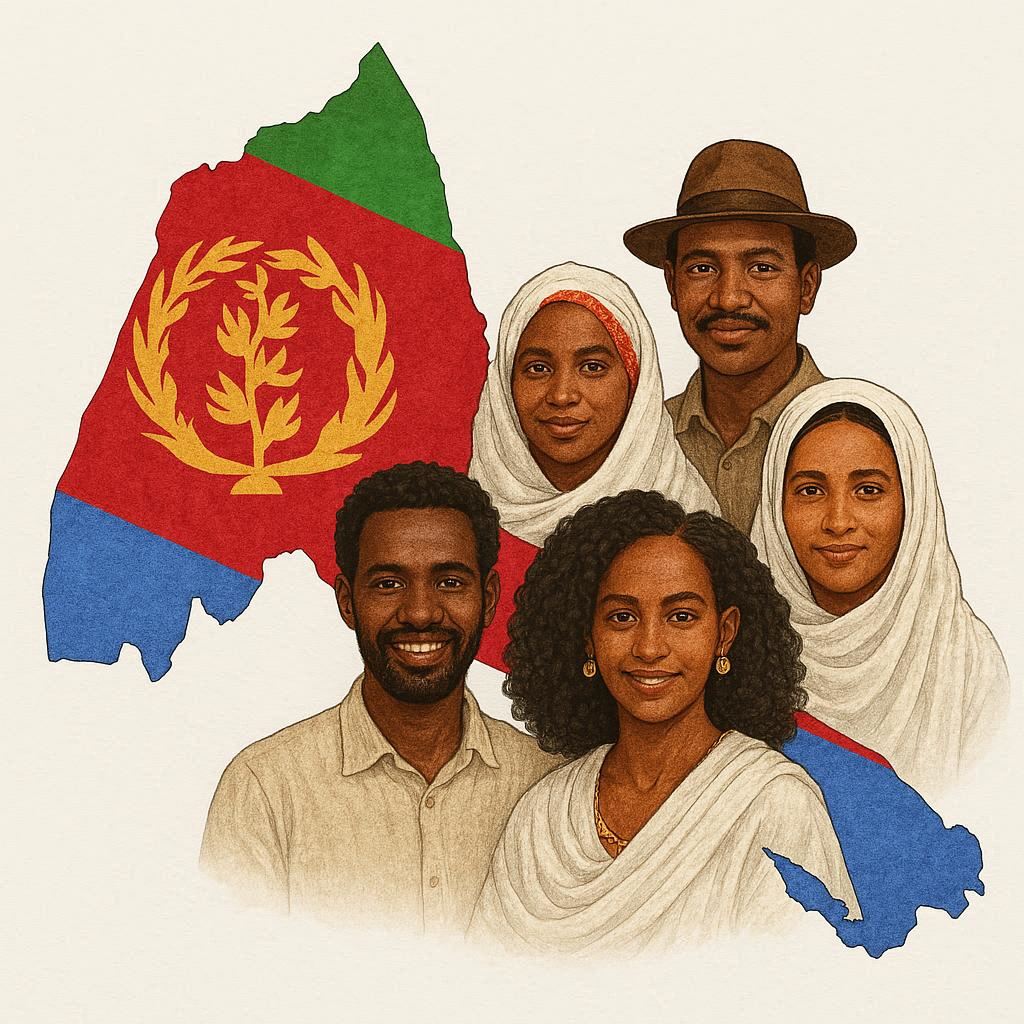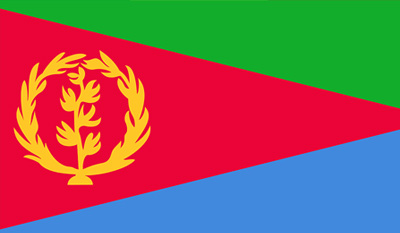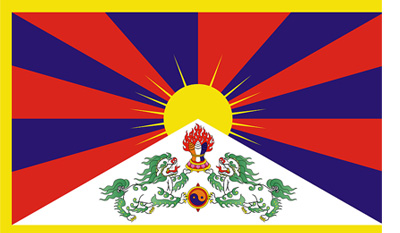Day 30
Eritrea
Praise Points
Strong communal and family bonds that preserve language, music, and liturgy — local practices that transmit belief and hope across generations. — “They devoted themselves to the apostles’ teaching and the fellowship, to the breaking of bread and the prayers.” Acts 2:42.
A people’s endurance and capacity to rebuild community after hardship — social resilience that can become a constructive rebuilding. — “He has sent me to proclaim liberty to the captives and recovering of sight to the blind, to set at liberty those who are oppressed.” Isaiah 61:1.
Prayer Points
Forced conscription, forced labor, and state abuses that fracture families and prevent stable discipleship. — “The LORD executes justice for the oppressed, and gives food to the hungry. The LORD sets the prisoners free.” Psalm 146:7.
State control of religious life, imprisonment of believers, and suppression of independent churches that break communal trust and public witness. — “For they have persecuted the righteous and taken a bribe, and the widow’s plea does not come before them.” — Isaiah 10:2 (applies to rulers who abuse justice) and Acts 4:29-31 for prayer under persecution.
Mass emigration and brain-drain that remove young leaders and dilute communal memory, leaving the church with fewer leaders and fewer youth. — “And let us consider how to stir up one another to love and good works, not neglecting to meet together.” Hebrews 10:24-25.
Denominational splits, distrust, and leadership vacuums create fragmentation rather than a unified witness. — “I appeal to you, brothers, by the name of our Lord Jesus Christ, that all of you agree, and that there be no divisions among you.” 1 Corinthians 1:10.
A Call for Salvation
Build resilient, decentralized discipleship to train lay leaders and mentor teens in small household groups so faith is passed on even if formal institutions are closed. “And what you have heard from me through many witnesses entrust to faithful men who will be able to teach others also.” — 2 Timothy 2:2.
Advocate non-violently for human dignity and religious freedom while practicing Christian civic responsibility: document abuses, partner with international faith-based relief and legal-advocacy organizations to protect families and prisoners. “Learn to do good; seek justice, correct oppression; bring justice to the fatherless, plead the widow’s cause.” — Isaiah 1:17. Pray for a coordinated legal/advocacy desk in the diaspora churches, safe channels for family support, and public theological statements calling for the release of prisoners.
Serve people in need visibly and persistently in the community (schools, health, food support) so that Christianity reflects as sacrificial, neighbor-focused love — a testimony that counters fear and indifference. “If anyone has the world’s goods and sees his brother in need, yet closes his heart against him, how does God’s love abide in Him?” — 1 John 3:17.
Eritrea sits on the Red Sea, with its ancient history linked to the Aksumite world and long trading links across the Red Sea. Over centuries, it experienced successive external rule (Ottoman-influenced coastal powers, a long period of Italian colonial rule, and later federation/annexation with Ethiopia) before a hard-fought war of independence in the late 20th century and formal independence in 1993. Eritrean culture is richly layered: several major languages (Tigrinya, Saho, Tigre, and others), strong oral and liturgical traditions, and a mix of religions — Christianity (ancient Oriental/Orthodox forms and newer Protestant communities) and Islam — that shape music, festivals, art, and communal life.
Christian faith has profound roots in the region (the Christianization of Aksum in late Antique times), and the Eritrean Orthodox tradition is one of Africa’s oldest continuous Christian communities. Historically, the missionary and episcopal efforts associated with the Aksumite Church and figures such as Frumentius (often credited with bringing and consolidating Christianity in Aksum in the 4th century) were pivotal in establishing an ancient Christian identity. Over centuries, the ancient church maintained close liturgical and theological ties with other Oriental Orthodox communities; in modern times, Roman Catholic and multiple Protestant/Evangelical missions and leaders have also contributed to Christian life and institutions in Eritrea.
Many Eritrean teens live with daily pressures that shape faith formation: forced national service (often long-term conscription), reports of forced labor and restricted freedoms, limited access to open religious education for some denominations, family separation from emigration, economic hardship, and the trauma those conditions cause. Those pressures push young people toward pragmatic survival choices (migration, prioritizing income over church life), increase distrust of institutions (including religious bodies seen as aligned or compromised), and reduce time and space for sustained discipleship and community life.
Day 30
Tibet
Praise Points
Preservation of cultural identity and spiritual devotion: Despite external pressures, Tibet has maintained its distinct traditions and moral teachings. (Psalm 78:4 – “We will not hide them from their children; we will tell the next generation the praiseworthy deeds of the Lord…”)
Survival of small Christian communities despite persecution: Faithful believers practice secretly, showing resilience. (Acts 16:5 – “So the churches were strengthened in the faith and grew daily in numbers.”)
International awareness and support for Tibetan rights: Global advocacy has kept Tibetan issues visible, providing moral and spiritual encouragement. (Isaiah 1:17 – “Learn to do right; seek justice. Defend the oppressed.”)
Prayer Points
Religious suppression and political control limiting Christian growth: (Daniel 3:17-18 – “If we are thrown into the blazing furnace, the God we serve is able to deliver us… but even if He does not, we will not serve your gods.”)
Cultural pressure leading youth to abandon Christian beliefs: (1 Timothy 4:1 – “The Spirit clearly says that in later times some will abandon the faith…”)
A Call to Salvation
Mentorship and discipleship of youth: Guiding teenagers in spiritual growth and biblical understanding. (Deuteronomy 6:6-7 – “These commandments that I give you today are to be on your hearts. Impress them on your children…”)
Fostering unity and reconciliation within the church: Building bridges between divided communities to strengthen collective faith. (Ephesians 4:3 – “Make every effort to keep the unity of the Spirit through the bond of peace.”)
Active prayer and evangelism despite challenges: Supporting the faith of believers and sharing Christ courageously. (Acts 1:8 – “But you will receive power when the Holy Spirit comes on you; and you will be my witnesses…”)
Tibet, often called the “Roof of the World,” has a rich history of over a thousand years, shaped by its unique high-altitude geography and deeply spiritual culture rooted in Tibetan Buddhism. Its monasteries, intricate art, and traditional festivals form the backbone of Tibetan cultural identity.
Christianity arrived in Tibet relatively late compared to its Buddhist traditions, with early Catholic and Protestant missionaries like Antonio de Andrade in the 17th century attempting to establish missions. Over time, limited access and political restrictions curtailed large-scale Christian growth. Today, Tibetan Christian teenagers face numerous struggles: societal pressure to conform to Buddhist traditions, restricted religious expression, and limited access to Bibles and Christian fellowship.
Internal divisions and differing doctrinal beliefs have also led to a lack of unity among Tibetan Christians, weakening communal support. To prevent the extinction of Christianity in Tibet, Tibetan Christians must embrace biblical principles of love, humility, and unity, actively mentoring younger Believers, and fostering a spirit of reconciliation and collective purpose within their communities.
Day 30
Syria
Praise Points
Lord, we thank You that Syria was the land where Saul became Paul and the Gospel first reached the Gentiles. Let this ancient heritage continue to remind Syrians of Your transforming grace. “And immediately something like scales fell from his eyes, and he regained his sight. Then he rose and was baptized.” – Acts 9:18
Father, thank You for preserving Your Church through years of bombings, persecution, and war. Strengthen those who remain, and help them rebuild with courage and faith. “We are hard pressed on every side, but not crushed; perplexed, but not in despair.” – 2 Corinthians 4:8
Lord, bless Syrian Christians who serve orphans, refugees, and the hungry. May their compassion bring many to the knowledge of Your mercy and love. “Let us not grow weary of doing good, for in due season we will reap, if we do not give up.” – Galatians 6:9
Prayer Points
Lord, heal the land from the bloodshed of ethnic and religious hatred. Protect believers who live under the threat of violence, and restore the Christian presence in cities once filled with faith. “He heals the brokenhearted and binds up their wounds.” – Psalm 147:3
Almighty God, shield Your Church from oppression and secret surveillance. Grant leaders wisdom and discernment to continue ministry safely under watchful eyes. “The Lord is my Rock, my Fortress, and my Deliverer.” – Psalm 18:2
Father, comfort those who have fled and those who remain in ruins. Let Your Spirit renew their hope and restore faith in a future where Your Name is freely proclaimed across Syria. “Those who sow in tears shall reap with shouts of joy.” – Psalm 126:5
A Call to Salvation
Lord, raise new pastors, evangelists, and teachers who can guide Your people through hardship. Equip them with boldness and wisdom to rebuild the Syrian Church from the ashes. “And I will give you shepherds after My own heart, who will feed you with knowledge and understanding.” – Jeremiah 3:15
Father, unite Your Church across denominations and ethnic lines. Let forgiveness and love overcome division and pain, that Syria may see Christ through their unity. “Bear with one another and, if anyone has a complaint against another, forgive each other; as the Lord has forgiven you.” – Colossians 3:13
Lord, empower Christian families to teach their children faith in You, even amid danger. Let the next generation of Syrians rise as unshakable witnesses for Christ in their homeland. “I have fought the good fight, I have finished the race, I have kept the faith.” – 2 Timothy 4:7
Syria, one of the world’s oldest civilizations, has historically been a center of faith, culture, and trade. Integral to empires like Mesopotamia, Persia, Greece, and Rome, it later became a key location for early Christianity. Damascus is where Saul of Tarsus encountered Christ. Cities like Antioch were vital to the early Church, where Jesus’ followers were first called Christians (Acts 11:26). For centuries, Syria has been home to various Christian communities—Orthodox, Catholic, and Protestant—that have influenced the global Church.
Culturally, Syria is intertwined with Arab identity and Islamic heritage. While the constitution allows for freedom of religion, the Assad regime’s politics create an environment where Christianity is tolerated but strictly controlled. Figures like Saint Ignatius of Antioch and John of Damascus helped preserve the faith through persecution. In the 19th and 20th centuries, missionary efforts established schools and hospitals that provided hope.
However, since the Syrian Civil War (2011–present), Christianity has faced near extinction due to ethnic cleansing and attacks by ISIS and extremist militias. Many churches have been destroyed, and believers have been forced to flee or convert. The Church now struggles with a lack of pastors and trained leaders. For Christian teenagers, life is filled with trauma and pressure to abandon their faith.
Today, the Church is threatened by ongoing political instability and religious tensions. Converts from Islam often face persecution, and state agents monitor churches. Permits to rebuild destroyed churches are frequently denied, and regional conflicts have heightened suspicion towards Christians.
To counter the decline of Christianity in Syria, Believers must embrace perseverance and unity. The Church should focus on strengthening family discipleship, enduring hardships, and training new leaders. Syrian Christians need to maintain their faith and love, holding onto the hope in Christ even in the darkest times.
Day 30
Mongolia
Praise Points
Unity in Christ: Christians must embrace unity, setting aside doctrinal differences for the sake of the Gospel. Ephesians 4:3 encourages Believers to “Make every effort to keep the unity of the Spirit through the bond of peace.”
Discipleship and Mentorship: Investing in the spiritual growth of young Believers is crucial. 2 Timothy 2:2 highlights the importance of passing on teachings to reliable individuals who can teach others.
Cultural Relevance: Christianity should be contextualized to resonate with Mongolian culture, without compromising core doctrines. Paul’s approach in 1 Corinthians 9:22, “I have become all things to all people so that by all possible means I might save some,” serves as a model for cultural adaptation.
Missionary Activity: Mongolia has become one of the leading per-capita missionary-sending countries, reflecting a growing passion for evangelism.
Biblical Translation: Completing the Old Testament in the Mongolian Standard Version is a significant milestone, providing Believers with access to Scripture in their native language.
Prayer Points
Cultural Resistance: Deep-rooted Buddhist traditions pose challenges to the acceptance of Christianity, with many viewing it as incompatible with Mongolian identity.
Materialism: The increasing focus on material wealth and success has led to a decline in spiritual values among the youth.
Legal Restrictions: While religious freedom is constitutionally guaranteed, practical limitations on missionary activities and church operations hinder the growth of Christianity.
A Call to Salvation
Unity: Ephesians 4:3 – “Make every effort to keep the unity of the Spirit through the bond of peace.”
Discipleship: 2 Timothy 2:2 – “And the things you have heard me say in the presence of many witnesses entrust to reliable people who will also be qualified to teach others.”
Cultural Relevance: 1 Corinthians 9:22 – “I have become all things to all people so that by all possible means I might save some.”
Youth Investment: 1 Timothy 4:12 – “Don’t let anyone look down on you because you are young, but set an example for the believers in speech, in conduct, in love, in faith, and in purity.”
Cultural Engagement: Romans 12:2 – “Do not conform to the pattern of this world, but be transformed by the renewing of your mind.”
Mongolia’s history with Christianity dates back to the 7th century when the Nestorian Church of the East found its way among the Mongol tribes. Under leaders like Kublai Khan, the Mongol Empire’s vast expanse in the 13th century saw Christian influence grow, primarily through figures such as Sorghaghtani Beki, Kublai’s mother, who was a devout Nestorian Christian. However, after the empire’s decline, Christianity faded from the region.
Modern Christianity began to take root in Mongolia in the early 1990s following the country’s shift from communism to democracy. The 1992 constitution enshrined religious freedom, allowing missionaries to enter and share the Gospel. Notable figures like Filipino Bishop Wenceslao Padilla played pivotal roles in establishing the Catholic presence, becoming the first Apostolic Prefect of Ulaanbaatar in 2003. His social services and community outreach efforts were instrumental in nurturing the fledgling Christian community.
In 2023, Pope Francis made a historic visit to Mongolia, marking the first papal visit to the country. During his visit, he praised Mongolia’s deep-rooted tradition of religious freedom, a legacy dating back to Genghis Khan, and encouraged the small Catholic population.








